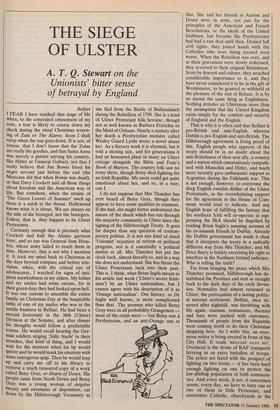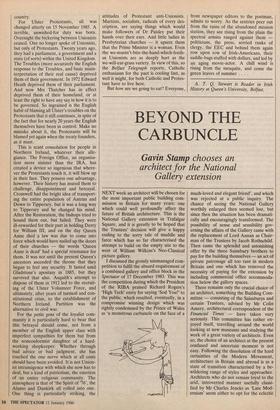THE SIEGE OF ULSTER
A. T. Q. Stewart on the
Unionists' bitter sense of betrayal by England
Belfast I FEAR I have reached that stage of life when, to the concealed amusement of my sons, a tear is likely to course down my cheek during the ritual Christmas screen- ing of Zulu or The Alamo. Soon I shall weep when the sun goes down. It is not, of course, that I don't know that the Zulus are really the goodies, and that Santa Anna was merely a patriot serving his country, like Hitler or General Galtieri; not that I really believe that Jim Bowie freed his negro servant just before the end (the Mexicans did that when Bowie was dead), or that Davy Crockett said all those things about freedom and the American way of life. But somehow, when the strains of `The Green Leaves of Summer' swell up there is a catch in the throat. Hollywood knows what it is about. We are always on the side of the besieged, not the besiegers. Unless, that is, they happen to be Ulster Protestants.
Curiously enough that is precisely what Crockett and half the Alamo garrison were, and so too was General Sam Hous- ton, whose army failed to reach them in time. However, that is not why I mention it. It took my mind back to Christmas in the days beyond compare and before tele- vision, when, with the critical eye of adolescence, I watched for signs of inci- pient mawkishness in my elders. My father and my uncles had some excuse, for in their green days they had looked upon hell. It was our custom to assemble the entire family on Christmas Day at the hospitable table of one of my uncles who was in the textile business in Belfast. He had been a second lieutenant in the 36th (Ulster) Division at the Somme, and after dinner his thoughts would follow a predictable course. He would recall hearing the Ger- man soldiers singing 'Stifle Alache in their trenches, that kind of thing, and I would wait for the moment when his lip would quiver and he would mask his emotion with some outrageous quip. Then he would leap up and carry me off to his library to retrieve a much treasured copy of a work called Betsy Gray, or Hearts of Down. His people came from North Down and Betsy Gray was a young woman of singular beauty and sweetness of disposition, cut down by the Hillsborough Yeomanry as she fled from the Battle of Ballynahinch during the Rebellion of 1798. She is a kind of Ulster Protestant folk heroine, though not as well known as Barbara Frietchie or the Maid of Orleans. Nearly a century after her death a Presbyterian minister called Wesley Guard Lyttle wrote a novel about her. As a literary work it is abysmal, but it told a stirring tale, and for generations it had an honoured place in many an Ulster cottage alongside the Bible and Foxe's Book of Martyrs. The country folk saw no irony there, though Betsy died fighting for an Irish Republic. My uncle could get quite emotional about her, and so, in a way, can I.
I do not suppose that Mrs Thatcher has ever heard of Betsy Gray, though they appear to have some qualities in common. If she had, she might better understand the nature of the shock which has run through the majority community in Ulster since the signing of the Hillsborough Treaty. It goes far deeper than any question of contem- porary politics. It is not any kind of ritual `Unionist' rejection of reform or political progress, nor is it essentially a political matter at all. Mrs Thatcher has put the clock back, almost literally so, and in a way she does not understand. She has thrust the Ulster Protestants back into their past. This is, I think, what Brian Inglis meant in his article last week (`Uister's secret Irish- ness') by an Ulster nationalism, but I cannot agree with his description of it as `Orange nationalism'. Our history, as Dr Inglis well knows, is more complicated than that. The yeomen who killed Betsy Gray were in all probability Orangemen most of the corps were — but Betsy was a Presbyterian, and an anti-Orange one at that. She and her friends in Antrim and Down were in arms, not just for the principles of the American and French Revolutions, or the ideals of the United Irishmen, but because the Presbyterians had had a raw deal until then. Denied full civil rights, they joined hands with the Catholics who were being treated even worse. When the Rebellion was over, and as their grievances were slowly redressed, they reverted to their original Britishness. Scots by descent and culture, they attached considerable importance to it, and they have never considered it to be in the gift of Westminster, to be granted or withheld at the pleasure of the rest of Britain. It is by no means the same thing as Englishness. Nothing irritates an Ulsterman more than the assumption that the United Kingdom ' exists simply for the comfort and security of England and the English.
That is why it is often said that Belfast is pro-British and anti-English, whereas Dublin is pro-English and anti-British. The Hillsborough agreement is living proof of this. English people who approve of the treaty should be in no doubt about the anti-Britishness of their new ally, a country and a nation which ostentatiously sympath- ised with Mussolini and Hitler, and much more recently gave enthusiastic support to Argentina during the Falklands war. This is not enough, however, to overcome the deep English racialist dislike of the Ulster Protestants, as the overwhelming support for the agreement in the House of Com- mons would tend to indicate. And any English hope of fulfilling the fantasy that the southern Irish will co-operate in sup- pressing the IRA should be dispelled by reading Brian Inglis's amusing account of his ex-assassin friends in Dublin. Already the Dublin government has made it clear that it interprets the treaty in a radically different way from Mrs Thatcher, and Mr Peter Barry is briskly exercising his right to interfere in the Northern Ireland judiciary. Who is telling the truth?
Far from bringing the peace which Mrs Thatcher promised, Hillsborough has de- stabilised the Province and sent us straight back to the dark days of the early Seven- ties. Normality had almost returned to Ulster, the prerequisite of a lasting politic- al internal settlement. Belfast, once de- serted after nightfall, was throbbing with life again; cinemas, restaurants, theatres and bars were packed with customers. Thousands of people from the Republic were coming north to do their Christmas shopping here. As I write this, an enor- mous notice is being erected in front of the City Hall. It reads 'BELFAST SAYS NO'. Overhead is the drone of RAF transports ferrying in an extra battalion of troops. The police are faced with the prospect of fighting on two fronts — it has been hard enough fighting on one to protect the law-abiding population of both communi- ties. And every week, if not, it sometimes seems, every day, we have to bury one or two of them in little Protestant, and sometimes Catholic, churchyards in the country.
For Ulster Protestants, all was changed utterly on 15 November 1985. A terrible, unwished-for duty was born. Overnight the bickering between Unionists ceased. One no longer spoke of Unionists, but only of Protestants. Twenty years ago, they had a parliament, a government and a state (of sorts) within the United Kingdom. The Troubles (more accurately the English response to the Troubles, and basic misin- terpretation of their real cause) deprived them of their government. In 1972 Edward Heath deprived them of their parliament. And now Mrs Thatcher has in effect deprived them of their homeland, or at least the right to have any say in how it is to be governed. So ingrained is the English habit of blaming all Ulster's troubles on the Protestants that it still continues, in spite of the fact that for nearly 20 years the English themselves have been in control. Make no mistake about it, the Protestants will be blamed yet again when the treaty founders, as it must.
This is scant consolation for people in Northern Ireland, whatever their alle- giance. The Foreign Office, an organisa- tion more sinister than the IRA, has created a device so ingenious that where- ver the Protestants touch it, it will blow up in their face. They possess one advantage, however. Their history has inured them to challenge, disappointment and betrayal. Cromwell had the bright idea of transport- ing the entire population of Antrim and Down to Tipperary, but it was a long way to Tipperary and he changed his mind. After the Restoration, the bishops tried to hound them out, but failed. They were ill-rewarded for their part in holding Derry for William III, and on the day Queen Anne died a law was due to come into force which would have nailed up the doors of their churches — the words 'Queen Anne is dead' had a special resonance for them. It was not until the present Queen's ancestors ascended the throne that they began to feel any security. It lasted until Gladstone's apostasy in 1885, but they survived that also. Asquith's attempt to dispose of them in 1912 led to the recruit- ing of the Ulster Volunteer Force, and ultimately, after years of turmoil and con- stitutional crisis, to the establishment of Northern Ireland. Partition was the alternative to civil war.
For the petits gens of the loyalist com- munity it is particularly hard to bear that this betrayal should come, not from a member of the English upper class with imperfect sympathies for them but from the nonconformist daughter of a hard- working shopkeeper. Whether through bad advice or bad judgment, she has touched the one nerve which at all costs should have been avoided. It is not Union- ist intransigence with which she now has to deal, but a kind of patriotism, the emotion of an entire religious community. The atmosphere is that of 'the Spirit of '76', the Alamo and Dunkirk all rolled into one. One thing is particularly striking, the attitudes of Protestant anti-Unionists. Marxists, socialists, radicals of every des- cription, are saying things which would make followers of Dr Paisley put their hands over their ears. And little ladies in Presbyterian churches — it upsets them that the Prime Minister is a woman. Even the we-mustn't-bite-the-hand-which-feeds- us Unionists are as deeply hurt as the we-will-eat-grass variety. In view of this, so the Belfast Telegraph reports, Catholic enthusiasm for the pact is cooling fast, as well it might, for both Catholic and Protes tant have to live here.
But how are we going to eat? Everyone, from newspaper editors to the postman, admits to worry. As the sentries peer out from the ruins of the abandoned mission station, they see rising from the plain the spectral armies ranged against them politicians, the press, serried ranks of clergy, the EEC and behind them again row upon row of Irish-Americans, their saddle-bags stuffed with dollars, and led by an aging movie-actor. A chill wind is rising from the mesquite, and come the green leaves of summer . . . .
A. T. Q. Stewart is Reader in Irish History at Queen's University, Belfast.



























































 Previous page
Previous page